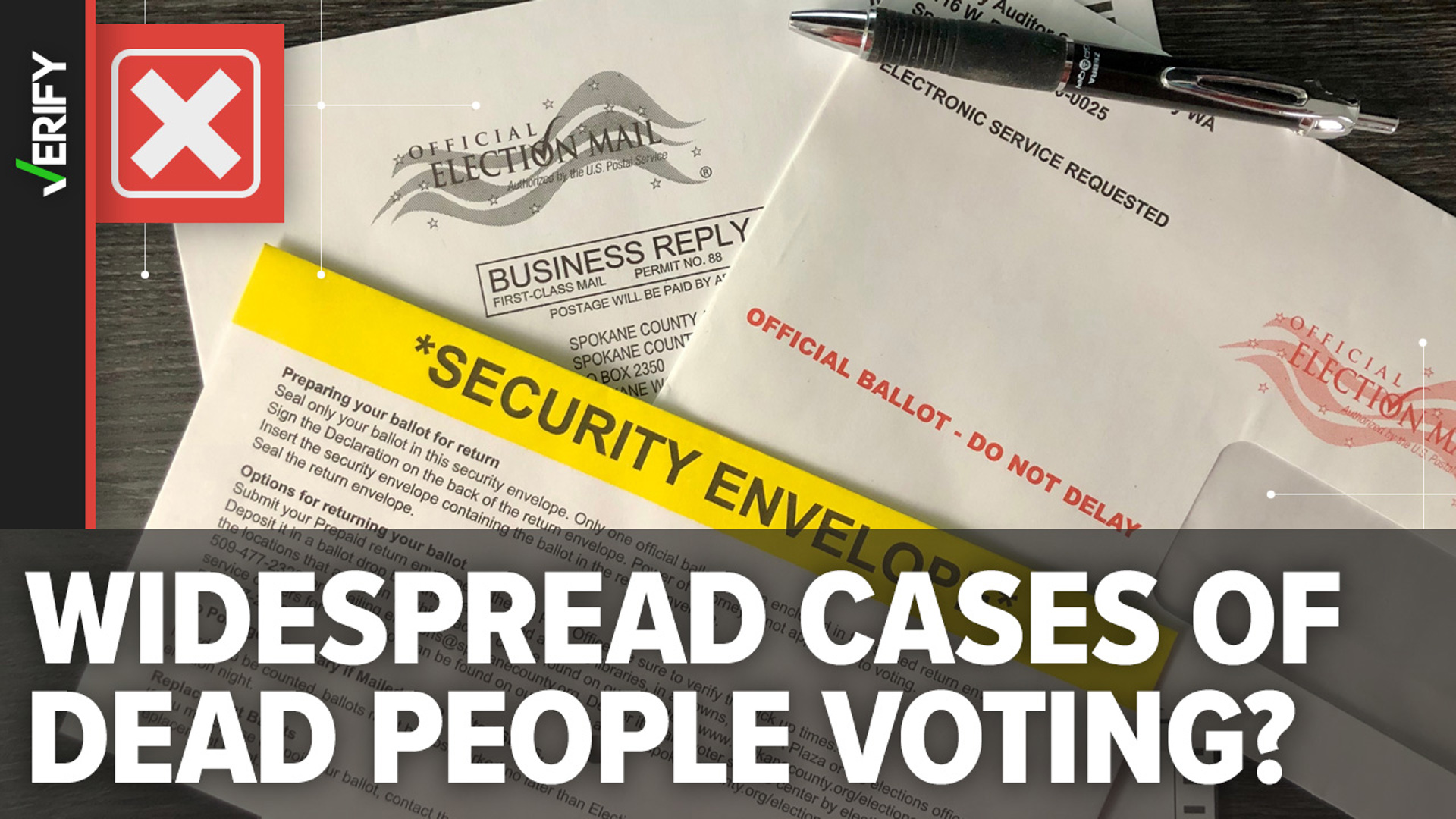After the 2020 presidential election, former President Donald Trump and others online claimed thousands of votes had been cast fraudulently on behalf of dead voters, even naming specific deceased people whose ballots were supposedly counted.
But these claims, which spread in many states including Arizona, Virginia, Nevada, Pennsylvania, Michigan and Georgia, were found to be false.
Now, as this upcoming Election Day approaches on Tuesday, Nov. 5, similar claims are circulating online.
“Missouri had a total of 78,421 register to vote in just ONE WEEK. Out of that number, 23,253 were DEAD PEOPLE!,” a post on X with over 2.8 million views claims.
THE QUESTION
Are thousands of votes being cast fraudulently on behalf of dead voters?
THE SOURCES
- Cybersecurity and Infrastructure Security Agency
- Brennan Center for Justice
- National Association of Secretaries of State
- National Conference of State Legislatures
- Michigan Department of State
- A study conducted by researchers at the Stanford Institute for Economic Policy Research (SIEPR)
- Jason Roberts, Ph.D., a political science professor at the University of North Carolina at Chapel Hill
THE ANSWER
No, thousands of votes are not being cast fraudulently on behalf of dead voters.
WHAT WE FOUND
There is no evidence of thousands of votes being cast fraudulently on behalf of dead voters. State and federal laws prohibit voter impersonation, including casting a ballot on behalf of a deceased person, and experts say this type of voter fraud is extremely rare.
The Brennan Center for Justice says many of the claims circulating on social media suggest that dead people are intentionally being left on voter rolls in many states to rig the upcoming election.
But elections officials in all states regularly update their voter registration lists and remove the names and voter records of individuals who have died, moved, registered elsewhere or have become otherwise ineligible from their voter rolls, according to the Cybersecurity and Infrastructure Security Agency (CISA) and the National Association of Secretaries of State (NASS).
The removal of deceased individuals from state voter rolls is based on death records shared by state vital statistics agencies, the state department of health, the Social Security Administration (SSA) or another similar entity, CISA and NASS both say.
“While there can be lag time between a person’s death and their removal from the voter registration list, which can lead to some official election mail, including mail-in ballots being delivered to addresses of deceased individuals, death records provide a strong audit trail to identify any attempts to cast ballots on behalf of deceased individuals,” CISA says on its website.
In certain circumstances, a person may return an absentee or mail-in ballot or vote early in-person, and then die before Election Day. VERIFY previously found that some states permit counting ballots cast by voters who die prior to the election, while other states prohibit counting deceased voters’ ballots.
The National Conference of State Legislatures (NCSL) says “it is hard to retrieve ballots from people who have died between casting their votes and Election Day.”
“Once the absentee ballot has been verified and removed from the envelope for counting, the ballot cannot be retraced to the voter,” the NCSL says. “Catching a ballot, then, is only possible when it is still in its return envelope, and only in cases where election officials have received notice of the death.”
When taken out of context, innocuous clerical or data entry errors that may appear to suggest suspicious activity can also lead to some confusion, according to CISA and the Michigan Department of State.
“In some cases, because of a clerical error, a ballot will be recorded as cast by a deceased individual when it was actually cast by a living individual with a similar name,” the department says. “For example, a ballot that was cast by John A. Smith, Jr., who is alive, might be accidentally recorded as having been received by John A. Smith, Sr., who is deceased.”
In those situations, CISA says election officials may contact the voter to correct any issues or investigate further before the ballot proceeds to the next step.
Even if a dead voter’s ballot mistakenly gets mailed, signature verification and voter fraud laws create additional safeguards against anyone else filling it out and submitting it. Voters who forge dead relatives’ signatures on ballots can face fines, probation or prison. And in some states, absentee voting requirements, such as witness signatures or notarization, add an extra barrier of protection.
Although there have been some cases of voter fraud by impersonating a dead person in the past, experts agree that it is “extremely rare.”
For instance, in 2020, a team of researchers at the Stanford Institute for Economic Policy Research (SIEPR) analyzed roughly 4.5 million voter records from the state of Washington for evidence of voter fraud involving deceased individuals. They found only 14 cases where a ballot may have been stolen and submitted on behalf of someone who had died.
Jason Roberts, a political science professor at the University of North Carolina at Chapel Hill, also told the Associated Press in 2022 that only a handful of people try this type of fraud each election, making it “very, very rare.”
The Associated Press contributed to this report.
This story is also available in Spanish / Lee este artículo también en español: No, miles de votos no están siendo emitidos de forma fraudulenta en lugar de electores fallecidos

